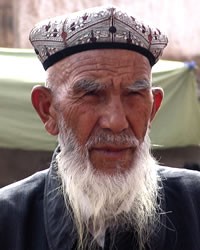Uyghur in Türkiye (Turkey)

Photo Source:
J4J2025
|
Send Joshua Project a map of this people group.
|
| People Name: | Uyghur |
| Country: | Türkiye (Turkey) |
| 10/40 Window: | Yes |
| Population: | 26,000 |
| World Population: | 12,284,400 |
| Primary Language: | Uyghur |
| Primary Religion: | Islam |
| Christian Adherents: | 0.40 % |
| Evangelicals: | 0.40 % |
| Scripture: | Complete Bible |
| Ministry Resources: | Yes |
| Jesus Film: | Yes |
| Audio Recordings: | Yes |
| People Cluster: | Uyghur |
| Affinity Bloc: | Turkic Peoples |
| Progress Level: |
|
Introduction / History
The Uyghur are a Turkic people located primarily in northwestern China. Significant communities can also be found in Kazakhstan, Uzbekistan, and Kyrgyzstan, with a small number in Afghanistan and Turkey. Their origins can be traced back to Turkish nomads who lived in Siberia. They became independent of the Turks in 744 AD, but were forced to leave their homeland in 840 AD. It was then that most of them immigrated to western China.
Uyghur literally means "allied." For centuries, the Uyghur were an important link between China and the rest of the world. They lived along the legendary Silk Road and worked as caravan drivers transporting Chinese goods. The strategic locations of their homes allowed them to be the "middlemen" between the Orient and Europe.
The Uyghurs in Turkey represent a very small percentage of the country's total population, but they have a long history and much cultural and linguistic interplay with the Turkish majority. There have been Uyghurs who have fled China to Turkey off and on for hundreds of years. Today the Chinese are again persecuting the Uyghurs, and some suspect genocide. Uyghurs have hoped to flee to Turkey, but the Chinese government has much economic leverage over that country. For that reason, the Uyghurs are not always welcome as refugees in Turkey, nor will the Turkish government give them moral support.
What Are Their Lives Like?
Traditionally, the Uyghur were shepherds and oasis farmers. Today, however, many are involved in businesses such as manufacturing, mining, oil drilling, trading and transportation. Their diet has been greatly influenced by their rural past. Meat is eaten at every meal, and dairy products are enjoyed daily. The Uyghur love to drink tea with milk. Their staple foods also include noodles and round bread made from maize or wheat flour.
The typical Uyghur house is square. It includes skylights and a flat roof that is used for drying grains and fruits. Bed frames, built low to the ground, are made of bricks so that they can be heated. They are used for both sleeping and sitting. Wall carpets are often used to decorate the home.
Various political, religious and ethnic conflicts have characterized the history of the Uyghur. Nevertheless, they are still described as being a "proud, happy, and independent people." They possess a unique blend of cultural elegance all their own. While remaining isolated enough to preserve their rural simplicity, they successfully made many contacts with other cultures. Such a rare mixture of simplicity and sophistication has given the Uyghur a unique and obvious charm.
Singing and dancing are important social activities among the Uyghurs. They play stringed, wind, and percussion instruments. The Mukam ("Twelve Great Melodies") have been part of Uyghur culture for many centuries.
Uyghur men usually wear long robes that have distinctive collars. The robes are fastened on the right side and have long waist bands. The village women wear loose-sleeved, one-piece dresses covered with black vests. Today, however, it is becoming more common for those living in cities to wear western style clothing.
What Are Their Beliefs?
Sunni Islam has been the dominant religion of the Uyghur since the tenth century. In the past, they were Muslim in name only; however, there is some renewal that is currently taking place among them, partly as a nationalistic banner.
What Are Their Needs?
Sadly, however, there are no known Christ followers among the Uyghurs in Turkey. As Muslims, they are taught that Christians are in spiritual error. The Bible has already been translated into the Uyghur language; Christian radio broadcasts and the JESUS Film are also available. Nevertheless, in spite of these efforts, they remain basically untouched with the gospel.
The eyes of the Uyghurs need to be opened to the saving truth of Jesus Christ. They need to experience the love and grace of the one, true God.
Prayer Points
Ask God to raise up faithful prayer teams who will break up the soil through worship and intercession until there is a strong Uyghur fellowship in Turkey.
Pray for the Holy Spirit to anoint the gospel as it goes forth via radio.
Ask the Holy Spirit to soften the hearts of the Uyghurs towards Christians so that they will be receptive to the gospel.
Pray for effectiveness of the JESUS Film among the Uyghurs in Turkey.
Ask the Lord to raise up strong local churches among the Uyghurs.